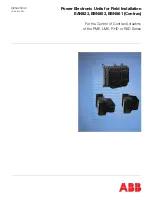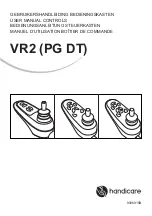
ZED-F9T - Integration Manual
It is possible to define different signal behavior (i.e. output frequency and pulse length) depending on
whether or not the receiver is locked to a reliable time source. Time pulse signals can be configured
using the configuration group CFG-TP-*.
3.6.1.5 Configuring time pulse with CFG-TP-*
The configuration group CFG-TP-* can be used to change the time pulse settings, and includes the
following parameters defining the pulse:
•
timepulse enable
- time pulse is active if this bit is set.
•
time pulse index
- Index of time pulse output pin to be configured. A device with one time pulse
output is configured with index 0.
•
antenna cable delay
- Signal delay due to the cable between antenna and receiver.
•
RF group delay
- Signal delay in the RF module of the receiver (read-only).
•
pulse frequency/period
- Frequency or period time of the pulse when locked mode is not
configured or active.
•
pulse frequency/period lock
- Frequency or period time of the pulse, as soon as receiver has
calculated a valid time from a received signal. Only used if the corresponding flag is set to use
another setting in locked mode.
•
pulse length/ratio
- Length or duty cycle of the generated pulse, either specifies a time or ratio
for the pulse to be on/off.
•
pulse length/ratio lock
- Length or duty cycle of the generated pulse, as soon as receiver has
calculated a valid time from a received signal. Only used if the corresponding flag is set to use
another setting in locked mode.
•
user delay
- The cable delay from the receiver to the user device plus signal delay of any user
application.
•
lock to gps freq
- Use frequency gained from GPS signal information rather than local
oscillator's frequency if flag is set.
•
lock to gnss freq
- Use frequency gained from GNSS signal information rather than local
oscillator's frequency if flag is set.
•
locked other setting
- If this bit is set, as soon as the receiver can calculate a valid time, the
alternative setting is used. This mode can be used for example to disable time pulse if time is
not locked, or indicate lock with different duty cycles.
•
is frequency
- Interpret the "Frequency/Period" field as frequency rather than period if flag is
set.
•
is length
- Interpret the "Length/Ratio" field as length rather than ratio if flag is set.
•
align to TOW
- If this bit is set, pulses are aligned to the top of a second.
•
polarity
- If set, the first edge of the pulse is a rising edge (Pulse Mode: Rising).
•
grid UTC/GPS
- Selection between UTC (0) or GPS (1) timegrid. Also effects the time output by
UBX-TIM-TP message.
•
grid UTC/GNSS
- Selection between UTC (0), GPS (1), GLONASS (2) and Beidou (3) timegrid.
Also effects the time output by UBX-TIM-TP message.
The maximum pulse length can't exceed the pulse period.
Time pulse settings shall be chosen in such a way, that neither the high nor the low period
of the output is less than 50 ns (except when disabling it completely), otherwise pulses can
be lost.
3.6.1.5.1 Example
The example below shows the 1PPS TIMEPULSE signal generated on the time pulse output
according to the specific parameters of the CFG-TP-* configuration group:
•
CFG-TP-TP1_ENA
= 1
•
CFG-TP-PERIOD_TP1
= 100 000 µs
UBX-19005590 - R01
3 Receiver functionality
Page 44 of 80
Advance Information
















































